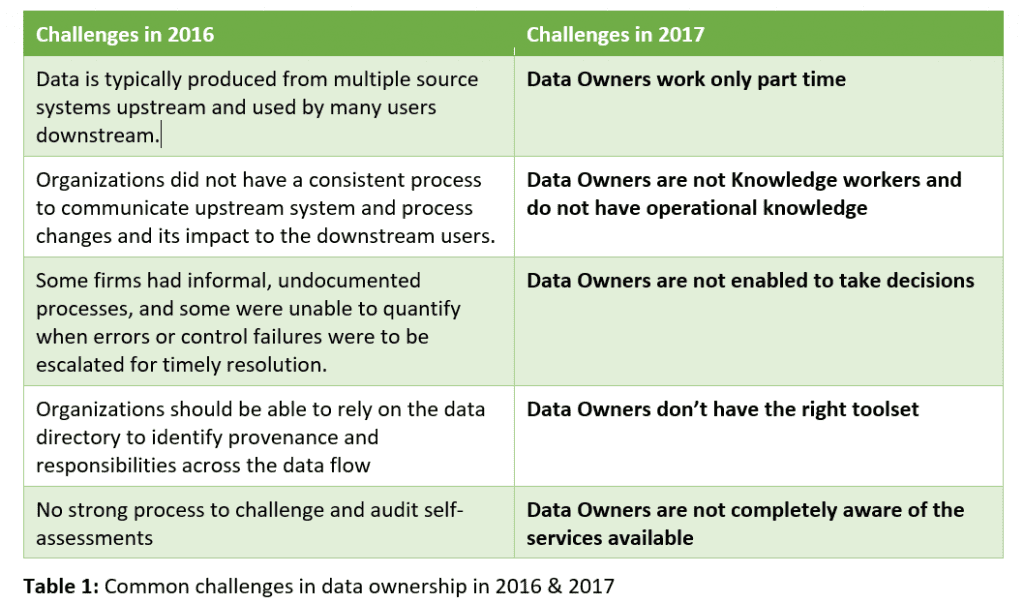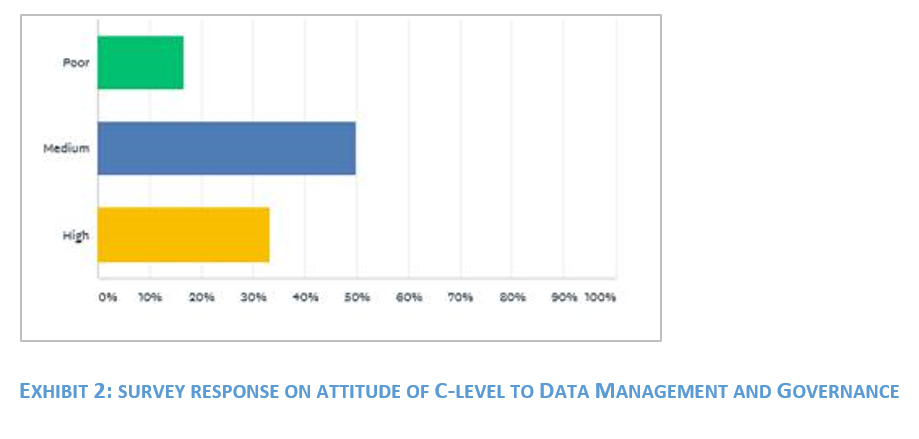Click to learn more about author Tejasvi Addagada.
An Outlook on Data Ownership
Data Ownership is often not a full-time job for most data owners while it can be a full-time profession for Data Stewards. While most banks have traversed in maturity across their Data Governance function, relatively only some Banks, started enabling themselves with required people capabilities. These include having to identify people who can take on the responsibilities of a data owner. Another approach can be to transition existing SMEs who are knowledge workers to be data owners. The common challenge that comes up is: is a data owner – a process owner, application owner or people (users’) manager? Well, data owners are often Business analysts, Process Owners, Application Owners, Project Managers, SMEs or knowledge workers supporting processes, people and applications that leverage data in scope and have familiarity and knowledge of the data in context.
A popular question that exists in the industry – Does a set of data have a single or multiple owners? Some mature Data Governance models have helped organizations embrace potential benefits of having a single data owner; but there are also models that state multiple owners such as the contributing and viewing data owners. This can be based on creation or update or application of data for a purpose. Though, the data owners have the accountability to maintain Data Quality, and other risks associated with data; they also require inputs from knowledge workers who have shared knowledge of the same data. That’s where the role of a co-owner or a SME come into play. These assisting roles can be standardized in the Governance structure. The Co-owners or SMEs can be application owners who un-assumedly would have analyzed the data in the application and also have a good understanding of it. The Co-Owners or SMEs can be consulted by data owners and stewards whenever required. The accountability of governing data can still lie with the data owners while the co-owners can have shared responsibilities.
Knowledge of processes, techniques, and tools is required by data owners to orchestrate governance activities. Data owners usually have business familiarity around data but do not necessarily understand the flow across its value chain. It is a challenge for data owners in leveraging metadata and Data Quality services. These are some common challenges that can be addressed by up-skilling the data owners. A culture of business ownership of data has to be promoted with every Data Governance service. This helps build awareness in the enterprise through the grassroots. Service promotion as a service should have its significance on par with activities of Service usage and Service improvement. On the same note, the data owners should be well aware of benefits of leveraging Data Management and Data Governance services. They can then further assist other stakeholders in their sphere of influence to look for value beyond the usual.
Common Challenges that Banks Face in Defining, Enabling and Empowering Data Owners
Overcoming Common Challenges You Have Seen
A sample survey from Dattamza from Banks, on their challenges in data ownership, is shown below:
While 33% of the survey respondents of a survey rolled out believe that there is not enough of the data owner’s time invested in data activities; 50% of them also believe that the data owners are not empowered to enforce policy or self-service their Data Management needs. And, the rest who make up 17% of the respondents state that the data owners do not have the right toolsets to manage data.
Attitude of C- level and Leaders Towards Data Management
& Data Governance
The active engagement of stakeholders requires a cultural change which also depends on the attitude of the same stakeholders towards the success of data office. Today, every firm boasts a data office but most data leaders lack an assessment of the attitude of their peers in C-level, towards the success of Data Management and Data Governance in the organization. If the attitude is positive, there will be a buy-in from the leaders. And, also the accountability trickles down to the data owners within the divisions. If the attitude of the leaders towards the success of Data Governance is not so positive, it may result in reduced accountability in the divisional grassroots and thus can impact the data owners within these divisions. That’s where promotion of Data Management services and their benefits play an important role in changing the approach towards the activities performed to better manage and govern the data.
A recent survey shows that 50% of the respondents state that their C-level has an attitude that’s just not positive, towards the success of Data Management. While only 16% state the attitude to be deprived, interestingly 33% of respondents state that the attitude is very positive towards success of Data Management in their organizations. Though the survey doesn’t represent the complete industry, there is research that shows the industry still needs to mature in having the C-Level understand and appraise the benefits of managing data as an asset. That’s when the data ownership model within the organization can be leveraged to complement the data office efforts in assisting the organization embrace the benefits.
Synopsis
Data Ownership is all about Identifying, Enabling, Empowering the right knowledge workers to address the accountability and the legal rights of data, preferably the ones who own the operational Business & Data processes. Firms classify their critical data as Enterprise data, Critical data, High Value or Elevated risk data and thus the focus initially should be to identify data owners for the critical data. The organization states its culture in policies and beliefs in data being governed as an enterprise asset.
This is Part One of a two-part series on Data Ownership. This part discussed the biggest challenges in Data Ownership in terms of dealing with leadership issues and the active engagement of stakeholders.
Part Two discusses the challenges faced by data owners, including accountabilities and responsibilities throughout an organization.



